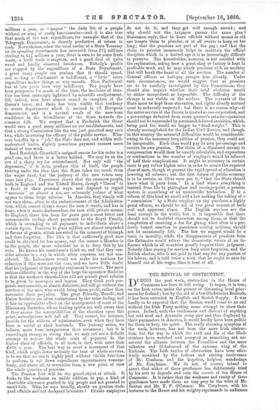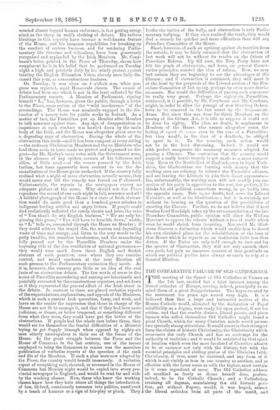THE REVIVAL OF OBSTRUCTION.
DURING the past week, obstruction in the House of Commons has been in full swing. It began, it is true, on the Irish votes, under the pretext of discussing local griev- ances for Ireland ; but by the aid of a few Gladstonian Radicals, it has been extended to English and Scotch Supply. It was hardly to be expected that the Session would come to an end without the Irish Party making some attempt to show their power. Indeed, with the restlessness and distrust of anything but cold steel and dynamite every now and then displayed by their paymasters in America, it would hardly have been politic for them to keep too quiet. The really alarming symptom of the week, however, has not been the mere Irish obstruc- tion, but the way in which the rank and file of the Glad- stonians have watched and accepted as something not un- natural the alliance between the Parnellites and the more talkative and ill-balanced of the extreme wing of the Radicals. The Irish tactics of obstruction have been effec- tively sustained by the tedious and ranting irrelevance of Mr. Cossham, and the hopeless, helpless wanderings of Mr. Conybeare. We do not, of course, intend to assert that either of these gentlemen has deliberately tried by his acts to degrade and ruin the morale of the House of Commons. It is rather that the weakness and vanity of these gentlemen have made them an easy prey to the wiles of Mr. Sexton and Mr. T. P. O'Connor. Mr. Conybeare, with his lectures to the House and his weighty reprimands to audiences wearied almost beyond human endurance, is fast getting recog- nised as the sheep in wolf's clothing of debate. His tedious bleatings in this capacity have become a well-known feature of the House, and his immense capabilities for breaking up the conduct of serious business, and for rendering Parlia- mentary life tiresome and ridiculous, have been generously recognised and applauded by the Irish Members. Mr. Cony- beare's letter, printed in the Times of Thursday, shows how complacent he is in his belief that he performed on Tuesday night a high and patriotic duty by his windy protest against treating the English Education Votes, already once fully dis- cussed this year, as non-contentious business.
On Tuesday, it was close on 4 o'clock a.m. when pro- gress was reported, amid Home-rule cheers. The course of debate had been one which is not in the least reflected by the Parliamentary reports. A Member of Parliament, signing himself "L.," has, however, given the public, through a letter to the Times, some notion of the "wild incoherence " of the proceedings. The House was nominally engaged in the dis- cussion of a money vote for public works in Ireland. As a matter of fact, the Parnellites put up Member after Member to talk nonsense against time. Any sign of disapprobation or impatience at such conduct was howled down by the main body of the Irish, and the House was altogether given over to a degrading orgy of obstruction. Dining the whole of the obstruction this week—and it has been rampant at every sitting —the ordinary Gladstonian Members and the ex-Ministers who lead them seem to have made no protest and expressed no dis- gust—for Mr. Morley's mere votes with the Government were, in the absence of any spoken censure of his followers and allies, of little avail—at the course pursued by the Irish faction, but have apparently been content to see the de- moralisation of the House go on unchecked. If the co.untry fully realised what a night of mere obstruction actually means, they would never rest till the remedy was forced on P. rliament. Unfortunately, the reports in the newspapers convey no adequate picture of the scene. Why should not the Times reproduce the record of one such night in full, nonsense and all ? A faithful photograph of the House in a state of Irish obstruc- tion would do more good than a hundred grave rebukes in indignant leading articles and angry letters. If people could find realistically reflected the rowdy shouts and jeers, the cries of "You shan't do any English business," "We are only be- ginning this game," "You will have to knuckle down," which, as "L." tells us, resounded through the House on Monday ; if they could witness the stupid din, the wanton and degrading waste of time and energy, and listen in the very words to the petty twaddle, the senseless incoherence, and the maundering folly poured out by the Parnellite Members under the imposing title of the due ventilation of national grievances,— they would soon mark down those English and Scotch abettors of such practices, over whom they can exercise control, and would condemn at the next Election all such persons to the Parliamentary extinction they merit. As it is, however, the country gets little or no idea of the real facts of an obstruction debate. The few words of sense in five hours of Parnellite maundering and ranting are laboriously and painfully extracted by the conscientious reporters, and set down as if they represented the general effect of the Irish share in the debate. In contrast to these are placed verbatim reports of the expostulations, explanations, and appeals of the Ministers, which in such a context look querulous, fussy, and weak, and leave on the reader the impression that those in charge of the House are not fit to manage it, and that if they had been more judicious, or firmer, or better tempered, or something different from what they were, they could have got the better of the obstructions. If people had the whole case before them, they would see for themselves the fearful difficulties of a Minister trying to get Supply through when opposed by eighty-six men utterly unscrupulous in their use of the forms of the House. In the great struggle between the Press and the House of Commons in the last century, one of the means employed to bring the Commons to reason was the merciless publication of verbatim reports of the speeches of the rank and file of the Members. If such a plan were now adopted by the Times, the country would benefit immensely. A verbatim report of everything said, shouted, or screamed in the House of Commons last Monday night would be copied into every pro- vincial newspaper in England, and would be read far and wide by the working classes. Now, those who know the working classes know how they hate above all things the introduction of low, ill-bred, unmannerly nonsense into politics, unrelieved by a touch of humour or a sign of fair-play or pluck. They
loathe the tactics of the bully, and obstruction is only Parlia- mentary bullying. If they once realised the truth, they would find a remedy far quicker and more efficacious than will any Procedure Committee of the House.
Short, however, of such an uprising against ob.truction from the outside, it may be fairly surmised that the obstruction of last week will not be without its results on the future of Procedure Reform. Up till now, the Tory Party have not felt the pinch of obstruction, and have, on general Conser- vative principles, resisted the idea of refoim. Now; we may feel certain they are beginning to see the advantages of the Closure ; and if obstruction is continued, they will meet it at the least by the proposals of the Liberal section of the Pro- cedure Committee of last spring, perhaps by even more drastic measures. Nor would the difficulties of passing such a measure be really very great. Perhaps the eighty-six Parnellites, reinforced, it is possible, by Mr. Conybeare and Mr. Cosshatn, might, in order to allow the passage of new Standing Orders, have to be removed in the last resort by the Serjeant-at- Arms. But since this was done for thirty Members on the passing of the Crimes Act, it is idle to suppose it could not be done for eighty. The idea, no doubt, is unpleasant to Members of the House, who cannot altogether resist the feeling of esprit de corps even in the case of a Parnellite ; but they would, in the face of a deadlock, be obliged to agree to it. To the country, such action would not be in the leant distressing. Indeed, it would see with perfect composure the necessary measures adopted for passing a Closure. The contention that the country would support a really heroic remedy is not made as a mere supposi- tion. Even in the North-East of England, even in loyal York- shire, the Gladstonians are learning with dismay that the working men are refusing to tolerate the Parnellite
and are leaving the Liberals to join their direct opponents— for, unfortunately, the working man will not readily join one section of his party in opposition to the rest, but prefers, if he thinks his old political connections wrong, to go bodily into the opposite camp. This is, no doubt, bad news for Liberal Unionists, as well as for Oladstonians ; but it is certainly not without its bearing on the question of the possibilities of enacting the Closure. Further, we do not believe that if next Session Lord Randolph takes up the recommendation of the late Procedure Committee, public opinion will allow Sir Williatu Harcourt to oppose the scheme without a loss of credit which even he would shrink from incurring. Nor could Mr. Glad- stone discover a distinction which would enable him to desert his own cherished plans for the rehabilitation of the tone of that House which he regards as an institution little less than divine. If the Tories are only bold enough to face and lay the spectre of Obstruction, they will not only smooth their own path, but gain an immense amount of that gratitude on which our political parties have always so much to rely at a General Election.



































 Previous page
Previous page